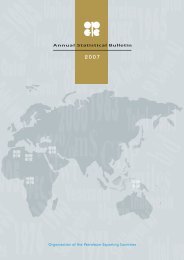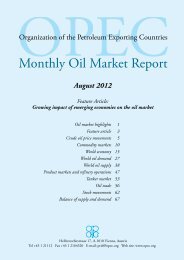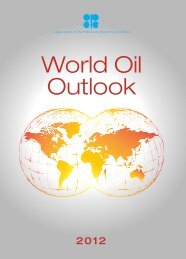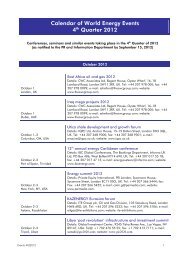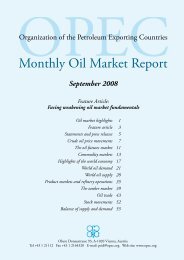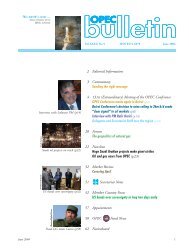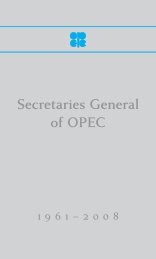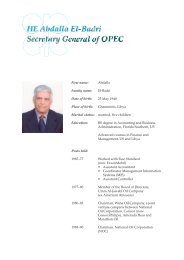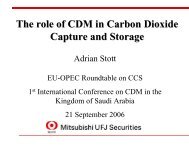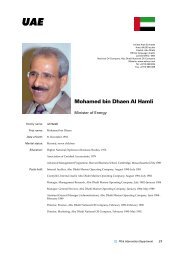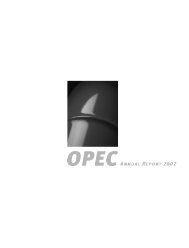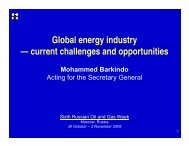Create successful ePaper yourself
Turn your PDF publications into a flip-book with our unique Google optimized e-Paper software.
<strong>OPEC</strong> bulletin 6/08<br />
12<br />
Dr Carlos Arturo Flórez Piedrahita, Executive Secretary of the Latin-American Energy<br />
Organization (OLADE), with Abdalla Salem El-Badri (r), <strong>OPEC</strong> Secretary General,<br />
during his visit to the <strong>OPEC</strong> Secretariat in May.<br />
ministerial meetings will now be organized around themes<br />
so that those attending can speak specifically about a<br />
topic and, thus, perhaps arrive at some consensus on<br />
commitments to be made.<br />
Under Floréz, the entire organization was also reorganized<br />
into several sub-regions, including Central<br />
America, the Andean Countries, the Southern Cone and<br />
the Caribbean. Simultaneously, a sub-regional Central<br />
American office was established in Guatemala. The main<br />
office in Quito will instead oversee the countries of the<br />
Andean region. “With these kinds of changes, we want<br />
to decentralize our work,” Floréz said. He added that<br />
OLADE is also considering opening sub-regional offices<br />
in the Caribbean and the Southern Cone. “With four or<br />
five sub-regions, we think we will be much more effective<br />
in our work,” he maintained.<br />
Founded to coordinate and unify activities and policies<br />
in the area of energy, OLADE’s over-arching goal is<br />
still integration. Such integration can be achieved simply<br />
between two countries, or among more, explained Floréz.<br />
Much of this, of course, relies on political will. But it also<br />
depends on supply and demand issues, as well as the<br />
quality, quantity and price of energy products.<br />
More importantly, perhaps, it depends on the harmonization<br />
of policies and regulations across the region.<br />
“We, as an organization, need to create compatible regulations<br />
[among Member Countries] so that legislation and<br />
regulation of the energy sector can be handled similarly<br />
and in a compatible way,” he said.<br />
Energy integration<br />
Floréz is quick to point out that it is not just one particular<br />
energy source that is of interest. Whether it is fossil<br />
fuels, renewables, or nuclear energy, the organization is<br />
not going to reject any of them outright. “One cannot be<br />
dogmatic,” he said. On the contrary, OLADE studies all<br />
energy sources since their final use depends on the availability<br />
of the resource base in each country.<br />
To date, OLADE’s Member Countries have provided<br />
constant support for its mission. The nine members of<br />
the organization’s current Board of Directors include<br />
Argentina, Brazil and Mexico, each of which is a very strong<br />
global energy player. To a degree, said Floréz, they help<br />
to set the tone and the pace of OLADE’s work. But other<br />
countries, too, regardless of their size, have made commitments<br />
to participate in the integration efforts. In fact,<br />
since energy integration can be seen as primarily a technical<br />
matter, many countries are willing to work together,<br />
despite possible political differences.<br />
“We are all very rich in natural resources,” Floréz<br />
added, giving several examples: Colombia has a lot of<br />
hydroelectricity; Venezuela is rich in hydrocarbons; Bolivia<br />
has growing reserves of natural gas; Brazil, too, recently<br />
discovered significant oil reserves. With these resources,<br />
there is simply no reason why the region’s countries<br />
should not work together to combat the poverty that has<br />
afflicted our people for centuries,” he said.<br />
In the same way that Latin America’s natural resources<br />
are spread around the region, so is the market for such<br />
resources. There is no reason for this, said Floréz. Part of<br />
OLADE’s mission, then, is to try to work through national<br />
governments to achieve the integration of these energy<br />
markets. Equally important, he said, is to try to identify<br />
those countries that have had the greatest success



